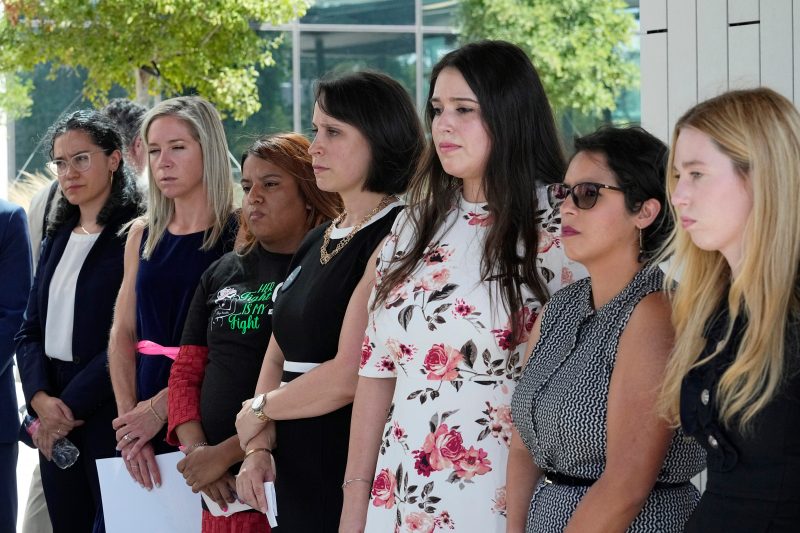Four women delivered hours of emotional testimony in a Texas courtroom this week about the trauma they say the state’s abortion law has racked on their pregnant bodies, culminating Thursday with a mother who said she felt “abandoned” by her home state when she was prevented from ending a doomed pregnancy within its borders.
Turned away at the hospital, one said she developed sepsis and nearly died. Another described having to leave the state to protect her healthy twin when the other developed a fatal condition.
Samantha Casiano, who was forced by the law to give birth to a fetus without a full skull, testified that her baby “was going to die inside or outside of my womb.”
Through tears on Wednesday, she struggled to describe what she was told her baby would look like — lacking pieces of its brain and a fully formed head.
Then she threw up on the witness stand.
The witnesses are part of a lawsuit filed on behalf of 13 women who had medically necessary care denied or delayed because of the Texas abortion ban. Their case is a key moment in the debate over how abortion bans affect women with medically complicated pregnancies.
Since Roe v. Wade was overturned in June 2022, triggering abortion bans in over a dozen states, women with potentially life-threatening pregnancy conditions have been turned away from hospitals for care they could have readily received before the ruling. Though all existing abortion bans include an exemption for medical emergencies or the life of the mother, doctors have been hesitant to act in many situations because they say they don’t feel protected by the vague language of the laws.
One report by researchers at the University of California at San Francisco identified dozens of examples in which medical providers say pregnant patients received care in the past year that deviated from care they would have received before the Supreme Court overturned Roe v. Wade.
The Texas lawsuit, which was filed in March by the Center for Reproductive Rights, argues that the state must clarify the scope of the law’s medical exception, which allows abortions to be performed only in “medical emergencies” where the patient is “at risk of death” or “substantial impairment of a major bodily function.”
The language is too vague, the plaintiffs say, paralyzing doctors who fear the legal risk they could incur if they perform an abortion on a woman ultimately deemed not sick enough to qualify for the exception: up to 99 years in prison, a fine of $100,000 and the loss of their medical license.
“We are not seeking to rewrite the statute,” Molly Duane, a lawyer representing the women, said in an interview. “All we’re seeking is for the judge to interpret state law, so it allows physicians in their good faith judgment to determine when a pregnancy poses a risk to the woman’s health.”
Lawyers in the case are asking for state District Judge Jessica Mangrum, who was elected as a Democratic judicial candidate in 2020, to block the laws for people who experience medically complicated pregnancies. The state of Texas is asking the judge to dismiss the case, denying that the state played a role and claiming that the women’s experiences were the fault of their doctors misapplying the law.
The judge could rule at any time.
The state’s arguments echoed those from some Republican lawmakers across the country who have defended exceptions to their state abortion bans by claiming that they cover a wide range of medical complications. One Florida lawmaker recently accused doctors of “playing games and politics” by willfully misinterpreting that state’s ban in denying emergency care.
“The Patients’ alleged injuries were the result of the independent actions of their medical providers who determined that they did not qualify for the medical exception in Texas’ abortion law,” lawyers for the state of Texas argued in their filing asking for the case to be thrown out.
On Thursday, Ingrid Skop, an OB/GYN who testified on behalf of the state, blamed the media for misleading doctors about what they can and cannot do, arguing that the abortion law “allows doctors to follow the standard of care to decide when to intervene.”
“They read the newspaper but not the law,” she said.
To emphasize their claim that the state was not to blame, the lawyers for the state asked each of the woman whether various Texas officials specifically told them that they could not terminate their pregnancies.
“Did at any time Attorney General Paxton tell you that you could not receive an abortion?” Amy Pletscher asked Austin Dennard on Thursday.
Dennard left Texas to receive an abortion after her fetus was diagnosed with a fatal condition.
“You know, I didn’t think to ask him,” Dennard said.
Pletscher repeatedly asked the judge to direct the witness to answer with a “simple yes or no.”
The judge refused.
“The question has been asked and answered, counsel,” Mangrum said.
As soon as her baby was diagnosed with anencephaly, Dennard, who works as an OB/GYN, said she immediately knew that she would have to leave the state.
“I felt like my pregnancy was not my own,” she said on the stand. “That it belonged to the state because I no longer had a choice of what I could do. I felt abandoned.”
In their court filing seeking to dismiss the case, lawyers for the state accused the plaintiffs of embarking on “splashy news conferences and media tours” to promote the case, claiming that Texas courts are not the “proper venue for individuals to ‘tell their stories,’ nor are they the place to ‘change the law’ after failing to convince the Legislature to adopt their preferred legislation.”
Duane, the women’s lawyer, said it is “hypocritical to the extreme” for the state to try to pass responsibility for the impact of the Texas abortion ban to the doctors.
“Physicians in Texas are now in an impossible situation,” she said. “Their hands are truly tied by the law. They’re worried if they do provide that care to their patients they will spend the rest of their lives in jail.”

































